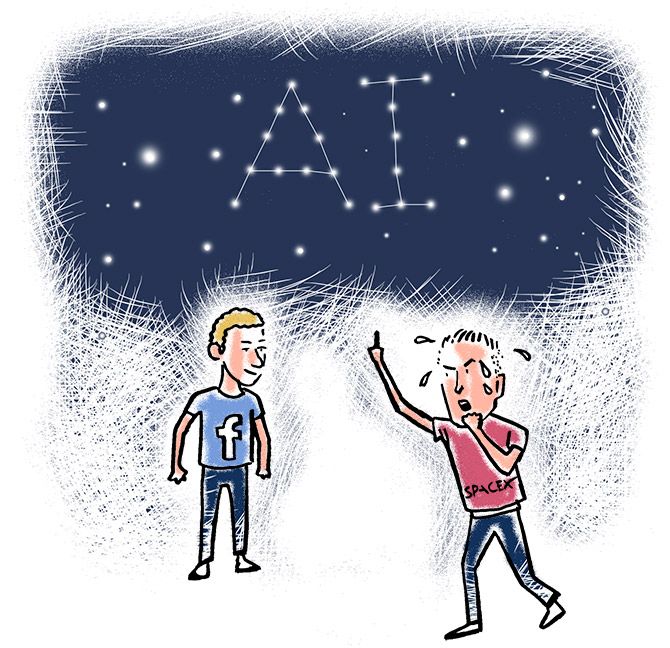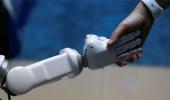'Some experts believe that the only jobs that will escape automation are the ones that involve anticipating the client's need, something that AI cannot do -- not yet anyway,' says Vikram Johri.
Illustration: Dominic Xavier/Rediff.com

One of the biggest television hits of last year, Westworld, debuted the trailer for its second season, due 2018, at the San Diego Comic Con last month.
About a theme park that houses eerily anthropomorphic robots, which are made to undergo despicable perversions for the enjoyment of the clients, the new season will take forward the nascent idea of these robots' growing sentience.
The show, which has grabbed 22 Emmy nominations, must be on the mind of Elon Musk and Mark Zuckerberg, who had a public tiff recently over the future of artificial intelligence, AI.
Musk has long been an alarmist, repeatedly invoking his fear that we are not far from a Westworld-like dystopia where the robots overpower humanity.
At least, on the show, the audience roots for the suffering robots. Musk's argument does away with such narrative exigencies.
At a Facebook Live event, Zuckerberg brushed aside such doomsday scenarios: 'In the next five to 10 years, AI is going to deliver so many improvements in the quality of our lives.'
'Whenever I hear people saying AI is going to hurt people in the future, I think, yeah, you know, technology can generally always be used for good and bad, and you need to be careful about how you build it, and you need to be careful about what you build and how it is going to be used.'
That, in a nutshell, is the scope of the debate, even though both Musk and Zuckerberg have more than a passing philosophical interest in its outcome.
Musk's company, Tesla, is at the forefront of developing driverless cars, a technology that uses AI ostensibly for the benefit of mankind.
Proponents of the driverless technology have long cited the lower accident rates that the technology will engender.
Musk has also put his money where his fear is, getting his other company SpaceX to work on a project to settle humanity on Mars.
A pie-in-the-sky idea at the moment, the project is an offshoot of SpaceX's commercial spaceflight business.
Even so, should it come to pass, it is safe to assume that only the zillionaires among us will get the chance to safeguard their humanity from the onslaught of murderous machines.
Meanwhile, Zuckerberg is keen to take Facebook deeper into the digital age, making it a one-stop shop for all our social media needs, just as Amazon has nearly conquered the retail space.
That said, AI, as we understand it, that is, the kind that makes tangible, palpable difference to the world around us, is missing from Facebook's current suite.
From bots that help answer user queries to the (unsuccessful) AI moderation, Zuckerberg's company has not taken the technology beyond the plain vanilla.
The dichotomy posited by Musk and Zuckerberg is a defining idea of our age.
Science fiction has long mapped the tension of encountering intelligence that is superior to ours, yet one that lacks in what writers, philosophers and scientists down the ages have failed to adequately define: Humanity.
The reason Westworld works so well is that its robots are so human-like it is nearly impossible to make the intellectual distinction between treating them as machines and assimilating them with the other, real humans.
They are as human as can be.
But between Zuckerberg's benign vision and Musk's sanguinary nightmare lies a more mundane, and paradoxically more fearsome, reality.
Coursera co-founder Andrew Ng, who worked on AI at the Chinese giant Baidu, sounded a note of prudence: 'I've been in a lot of private conversations with... business leaders who are working on new AI products that will wipe out tens of thousands of jobs in a single company, maybe more across multiple companies.'
'And the interesting thing is that a lot of people whose jobs are squarely in the crosshairs of the technologies... they don't have the training to understand AI.'
The manufacturing setup has already been transformed by automation, but a deeper transformation may be in the offing in services.
From drones that deliver groceries to, well, driverless cars, jobs on both ends of the skills spectrum are in real danger.
With programmes such as IBM's Watson getting increasingly sophisticated in dishing out diagnosis and treatment, some experts believe that the only jobs that will escape automation are the ones that involve anticipating the client's need, something that AI cannot do -- not yet anyway.
Like hairdressers or teachers.
Whether advanced AI will finish us is a question only time can answer, but we are faced with a more pertinent question in the present.
Maslow, the originator of the world's most quoted hierarchy, would have likely placed the threat to humanity from AI a couple of rungs higher, and therefore not worth losing sleep over, compared to the bread-and-butter disruption that everyday technology is wrecking.












 © 2025
© 2025